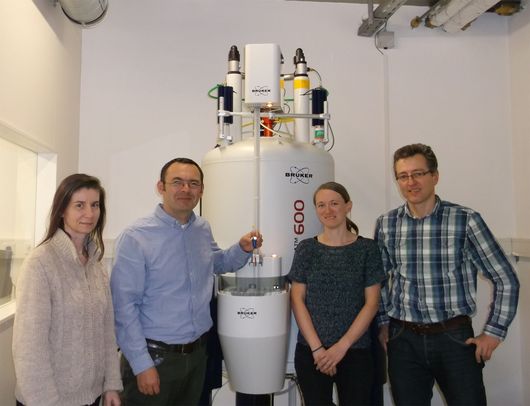Basic research leads to a promising candidate against Alzheimer’s disease

Basic research leads to a promising candidate against Alzheimer’s disease
Increasing numbers of dementia above all Alzheimer’s disease is a serious social challenge worldwide. Characteristic for such diseases are protein aggregates in the brain, in particular amyloid plaques in the extracellular matrix and intracellular aggregates called tau tangles. There has been a tremendous effort to develop treatments that prevent the formation of protein aggregates or to dissolve them. Unfortunately all clinical trials following this strategy failed so far, raising questions if we sufficiently understand the mechanism of plaque and tangle formation.
Together with American colleagues at Emory University in Atlanta/Georgia scientists of the Institute of Molecular Biology of Salzburg University succeeded in gaining a better understanding of the disease mechanism. Prof. Dr. Hans Brandstetter, Prof. Dr. Chiara Cabrele, Dr. Elfriede Dall und Dr. Mario Schubert could show that the enzyme Legumain is contributing under certain conditions to the formation of amyloid plaque and tangle formation. Hans Brandstetter says „The discovery is so exciting because it explains for the first time why dementia is correlated with age – because the pH gets slightly more acidic with increasing age which in turn alters the function of the enzyme Legumain leading to a malfunction. This observation leads to the development of a therapeutic strategy: The selective inhibition of Legumain should prevent protein aggregation and thus stop the progression of the disease.
The scientists found potent inhibitors that selectively decreased the activity of the enzyme in the test tube. In a second step one inhibitor with the ability to pass the blood-brain barrier was further developed showing an impressive effect in animals: in mice that were developed as model for Alzheimer’s disease, a treatment with the inhibitor not only stopped the further development of dementia but reversed the symptoms.
This work demonstrates how basic research of enzymes and their function can lead to the development of novel therapeutic strategies for a condition for which no effective medication exists so far.
The findings were published 27th March 2017 in Nature Communications http://dx.doi.org/10.1038/NCOMMS14740
Publication:
Zhentao Zhang, Obiamaka Obianyo, Elfriede Dall, Yuhong Du, Haian Fu, Xia Liu, Seong Su Kang, Mingke Song, Shan-Ping Yu, Chiara Cabrele, Mario Schubert, Xiaoguang Li, Jian-Zhi Wang, Hans Brandstetter and Keqiang Ye: “Inhibition of delta-secretase improves cognitive functions in mouse models of Alzheimer’s disease” in: Nature Communications on 27th March 2017.
Contact:
Dr. Elfriede Dall, Department of Molecular Biology, University of Salzburg,
Billrothstraße 11, 5020 Salzburg, Austria
Tel. +43 662 8044 7278
www.uni-salzburg.at/xray




